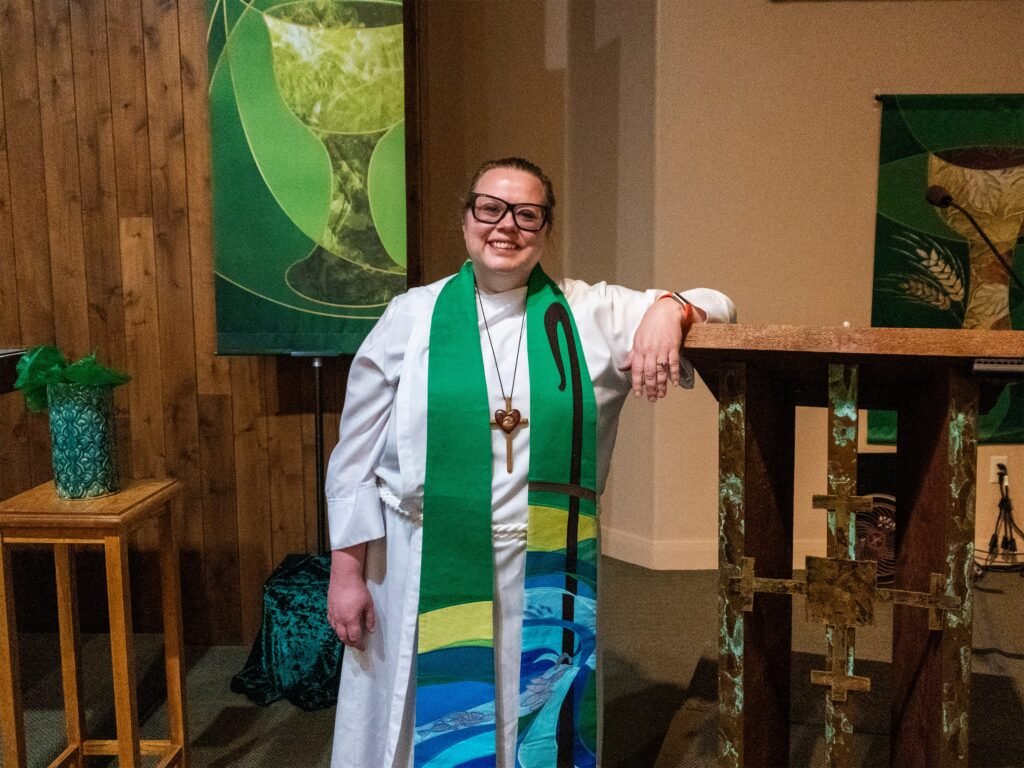From Proselytizing to Pastoring: A Journey of Faith and Transformation

Former LDS proselytizer embraces a new mission — as a Lutheran pastor
Introduction: A Change of Heart
The journey of faith for many individuals can often take unexpected turns, leading to profound transformations in belief systems and roles within their communities. This blog post explores the remarkable transition of an individual who once dedicated their life to proselytizing within the Church of Jesus Christ of Latter-day Saints (LDS) and has since embraced a new path as a Lutheran pastor. This change of heart not only reflects a personal evolution but also highlights significant theological differences between these two faith traditions.
Having devoted years to the LDS Church, this former proselytizer was initially entrenched in the tenets and teachings of the Latter-day Saints, passionately spreading what they believed to be the true gospel. However, as they delved deeper into the complexities of faith, they began to encounter differing theological perspectives that sparked critical reflection and introspection. The transition from LDS teachings to those of Lutheranism was motivated by a search for clarity, truth, and a more profound connection with the message of grace as understood in the Lutheran tradition.
This exploration led to the recognition of core differences, such as the understanding of salvation, the authority of scriptures, and the nature of Christ. These theological distinctions played a crucial role in guiding the individual towards a Lutheran perspective, ultimately culminating in their decision to take on the role of a pastor. As they embarked on this new chapter, they committed themselves to serving a congregation that embraces salvation by grace through faith, a principle often emphasized in Lutheran doctrine. This narrative will further elaborate on their experiences and insights, revealing how this transformative journey has shaped their mission as a spiritual leader in the Lutheran faith.
Background: Life in the LDS Church
Growing up in the Church of Jesus Christ of Latter-day Saints (LDS Church), the individual’s formative years were steeped in the rich traditions and values characteristic of the faith. The teachings of the church emphasized family, service, and the importance of community. From an early age, the individual was taught the significance of adhering to moral principles and living a life centered on faith. This foundational upbringing served not merely as a set of rules but as a guide to navigating the complexities of life.
As they matured, their participation in church activities further solidified their commitment to the LDS faith. Regular attendance at Sunday services, engagement in youth programs, and involvement in community service projects played a pivotal role in shaping their personal beliefs. These experiences fostered a strong sense of purpose and belonging, which would later manifest during their time as a proselytizer. The teachings of the LDS Church cultivated a worldview that focused on sharing the gospel and acting as an ambassador of faith, which the individual embraced wholeheartedly.
During their mission, the individual faced the challenges and triumphs typical of proselytizing efforts. The rigorous schedule, extensive travel, and the need for constant engagement with diverse communities taught valuable lessons in resilience and determination. Interactions with individuals of varied beliefs offered rich opportunities for personal growth and understanding. Throughout these experiences, the core teachings of the LDS Church informed their approach, instilling in them the belief that they were fulfilling a divine commission to spread the message of Jesus Christ. Ultimately, this dynamic blend of teachings, experiences, and personal connections laid the groundwork for a transformative journey within the faith, leading to a deeper understanding of ministry and pastoring in their ensuing journey.
The Turning Point: Questioning Beliefs
The journey of faith often encompasses a series of pivotal moments that challenge one’s beliefs and perceptions. Within the context of the LDS framework, there comes a time when individuals may find themselves questioning the doctrines that have shaped their spiritual lives. This questioning can arise from various experiences and interactions that provoke a deeper evaluation of one’s faith.
One crucial aspect that often leads to doubt and reevaluation involves engaging with individuals from different religious backgrounds. Conversations with members of other denominations can open up new perspectives and challenge the exclusivity of one’s beliefs. For instance, a dialogue with a Baptist or a Catholic may introduce theological concepts that differ significantly from those held within the LDS tradition. Such encounters can prompt an individual to reflect on the fundamental beliefs that they have been taught, leading to moments of uncertainty.
Personal experiences also play a pivotal role in this process. Life events, such as the loss of a loved one or facing societal injustices, can disturb the preconceived notions about faith and spirituality. When individuals confront hardships, they may begin to question the narratives they have previously accepted without doubt. The struggle to reconcile painful experiences with the teachings of the LDS faith can serve as a catalyst for questioning deeply held beliefs.
Additionally, specific theological issues may arise that provoke critical thinking and introspection. Topics such as the nature of God, the concept of grace, or the role of scripture can become contentious points of discussion for those within the LDS community. Grappling with these issues may lead to confusion and a reevaluation of one’s faith. Ultimately, this journey of questioning is not merely about seeking answers but rather reflects the evolution of faith as individuals embark on a transformative spiritual path.
Discovering Lutheranism: A New Perspective
The journey of faith is often characterized by exploration and discovery, and my transition to Lutheranism was no different. Initially introduced to Lutheranism through a friend who shared a passion for its teachings, I was captivated by its emphasis on grace and the accessibility of God’s love. Unlike other denominations that often stressed performance and personal merit, Lutheranism’s foundational belief in salvation by grace through faith resonated deeply with me. This doctrine emphasized that faith, rather than deeds, was paramount in receiving God’s grace, providing a new lens through which I could view my relationship with the divine.
As I began to study the teachings of Martin Luther and the Book of Concord, I found clarity in the Lutheran understanding of sacraments. The significance of baptism and communion as means of grace, rather than mere symbols, appealed to my desire for a tangible connection to my faith. Furthermore, the doctrine of justification became a cornerstone of my belief system; knowing that my standing before God was based solely on Christ’s righteousness brought an unparalleled sense of peace and relief.
However, this new path was not without its challenges. The transition required navigating preconceived notions and familial expectations tied to my previous beliefs. Engaging with the Lutheran community offered solutions and guidance, as members welcomed my inquiries and provided insights into their practices. Attending services, participating in Bible studies, and connecting with pastoral leadership helped solidify my understanding and commitment to Lutheran teachings. The support from this community underscored the importance of fellowship within faith, as they were instrumental in helping me embrace this new perspective and integrate it into my daily life. The journey into Lutheranism was transformative, leading me to a more profound understanding of faith, community, and grace.
The Transition: Process of Becoming a Pastor
Transitioning from a role of proselytizing within the LDS Church to pastoral ministry in the Lutheran Church is a significant spiritual and professional journey. This transformation involves a rigorous process that requires dedication, theological education, and experiential learning. The first crucial step in this transition is acquiring a formal theological education. This may involve enrolling in a seminary or theological institution that aligns with the beliefs and practices of the Lutheran faith. Such education not only deepens the individual’s understanding of sacred texts and church history but also equips them with the necessary skills to interpret scripture and preach effectively.
Mentorship plays a vital role in this journey. Engaging with established pastors and church leaders provides invaluable guidance and support. These mentors can offer insights on the nuances of pastoral care, community engagement, and the practicalities of church administration. Their experience can help refine the individual’s understanding of congregational dynamics and enhance their ability to relate to and minister effectively to their future parishioners.
Alongside formal education and mentorship, practical experiences are instrumental in the transition process. Volunteering in church-related activities, participating in internships, or serving in outreach programs enables the individual to apply theoretical knowledge in real-world settings. These experiences foster a deepened sense of calling and responsibility toward the congregation and community.
However, this journey is not without its challenges. The individual may face difficulties such as reconciling different theological perspectives, gaining acceptance within a new faith community, or overcoming personal doubts about their suitability for pastoral leadership. Such challenges, while daunting, can lead to profound growth and transformation, ultimately preparing the individual for a fulfilling vocation in pastoral ministry.
Embracing the New Mission: A Pastor’s Perspective
Transitioning from proselytizing to pastoring marks a significant shift in focus and philosophy, significantly impacting the approach to ministry. As a Lutheran pastor, my understanding of this calling emphasizes not only preaching the Word but also fostering a sense of community and connection among congregants. This shift is rooted in the belief that ministry is inherently relational, inviting individuals to grow in their faith together, rather than simply seeking conversion.
In this context, the importance of community cannot be overstated. I strive to create an environment where members feel supported and valued, which is essential for effective pastoral care. By actively engaging with various groups within the church, such as youth, seniors, and families, I can better understand their unique needs and experiences. This inclusive approach allows me to offer more tailored outreach initiatives that resonate with the congregation. My past experiences also shape this pastoral commitment; having participated in numerous community service projects, I learned firsthand the profound impact that collaborative efforts can have on both individuals and the church as a whole.
My specific mission as a pastor focuses on nurturing spiritual growth and social responsibility. Goals include enhancing community outreach programs that address pressing social issues while providing a platform for congregants to actively participate in service. These initiatives are guided by the belief that faith is a living practice, which drives the church to be a beacon of hope and a catalyst for positive change in the community. Engaging in dialogue with the congregation allows me to shape these programs collaboratively, ensuring they are reflective of our collective vision for ministry. Through this comprehensive approach, I aim to foster an atmosphere of learning, support, and growth as we journey together in faith.
Impact on the Community: Bridging Beliefs
In an increasingly diverse society, the ability to foster dialogue among individuals with differing beliefs has become more essential than ever. The journey from proselytizing to pastoring has equipped many leaders with tools to connect with former LDS members and other faith communities, creating a space for mutual understanding and respect. Through various initiatives, these individuals have made significant strides in bridging the gaps that often exist between differing belief systems.
One noteworthy approach taken by community pastors involves organizing interfaith dialogues. These events provide a platform for individuals from various backgrounds to come together, share their stories, and address misconceptions. By facilitating open and respectful conversations, the pastors aim not only to promote tolerance but also to build lasting relationships among participants. These dialogues have proven beneficial in dispelling stereotypes and fostering an atmosphere of inclusivity, where people feel valued regardless of their beliefs.
Additionally, key community initiatives focused on outreach and service have brought together individuals from all walks of life. Whether it’s a food drive, a community clean-up day, or workshops that address social issues, these activities emphasize the importance of collective action. By engaging former LDS members and others in service-oriented projects, pastors have demonstrated that faith transcends doctrinal differences; it can be a unifying force within a community. Furthermore, these initiatives are designed not only to serve immediate needs but also to encourage long-term connections and understanding among diverse groups.
Through these efforts, the impact on the community has been substantial. The emphasis on dialogue, mutual respect, and collective service has created an environment where individuals feel comfortable sharing their beliefs and experiences. As a result, communities become stronger and more cohesive, demonstrating the power of faith as a instrument for transformation and understanding.
Reflections on Faith: Lessons Learned
Throughout the transformative journey from proselytizing to pastoring, numerous lessons have emerged, each contributing to a deeper understanding of faith and spirituality. One of the most profound insights gained is the significance of humility. Embracing humility allows individuals to acknowledge their limitations while fostering a willingness to learn from others. This shift in perspective can profoundly impact one’s approach to both personal faith and communal interactions. As a pastor, the ability to listen and to serve becomes paramount, reinforcing the idea that leadership is not solely about authority but about service and connection.
The quest for truth has also played a crucial role in this journey. In searching for spirituality that resonates on a personal level, it is essential to navigate through various interpretations and doctrines. This exploration has revealed that truth is often found not in rigid dogmas, but in experiences and relationships that bring individuals closer to the divine. The pursuit of truth encourages an openness to different perspectives, allowing for a richer, more nuanced understanding of faith. This approach not only enriches personal belief systems but also enhances the pastoral ministry, enabling one to engage more authentically with diverse congregational members.
Moreover, spiritual growth emerges as a fundamental aspect of overcoming challenges encountered during this transition. Each obstacle faced, whether personal or communal, presents an opportunity for growth and reflection. By leaning into these challenges, individuals can cultivate resilience and deepen their faith. Personal anecdotes, such as moments of doubt transformed into strength or community support during trying times, illustrate how struggles can lead to profound spiritual insights. This ongoing process of learning and growth reinforces the vital importance of faith as a living, dynamic journey, guiding individuals toward grace and compassion in their lives and ministries.
Conclusion: A Life Transformed
The exploration of faith is often a deeply personal journey, one that can lead individuals down unexpected paths. In the narrative of a former LDS proselytizer transitioning into the role of a Lutheran pastor, we witness a profound transformation that underscores the significance of discovering one’s true calling. This journey reflects the complexities of belief systems and showcases how individuals can evolve their spiritual identities over time. The transition highlights not only a change in religious affiliation but also a shift in understanding one’s mission in life.
Throughout the blog post, we have examined various facets of this remarkable journey. The initial commitment to spreading faith as a proselytizer embodies a strong sense of purpose, but as our subject transitioned into pastoring, the focus shifted towards nurturing a community and serving others. This new role brings forth a mission-driven approach where compassion, understanding, and inclusivity take precedence. The ability to embrace different perspectives while maintaining a steadfast commitment to service illustrates the adaptability and growth that faith can inspire.
Moreover, the ongoing mission to serve others, regardless of their backgrounds, emphasizes the universal nature of love and support in spiritual practice. It reveals that at the heart of any faith lies the fundamental desire to uplift and guide fellow beings. This journey of faith, marked by a definitive change, serves as a testament to how belief and purpose can converge to shape a fulfilling life. Ultimately, the story of this individual’s transformation serves as a powerful reminder that the paths we take in our spiritual quests can lead us to a deeper understanding of ourselves and a greater ability to impact the world around us.












Leave a Reply
You must be logged in to post a comment.